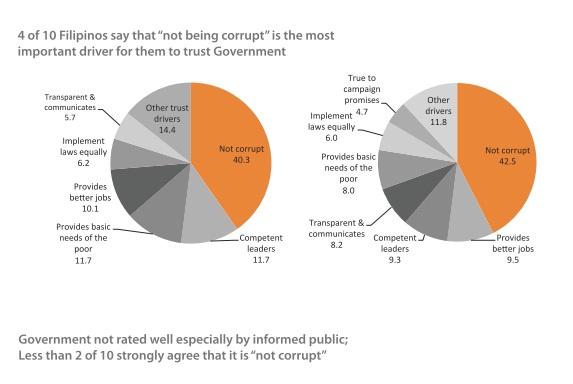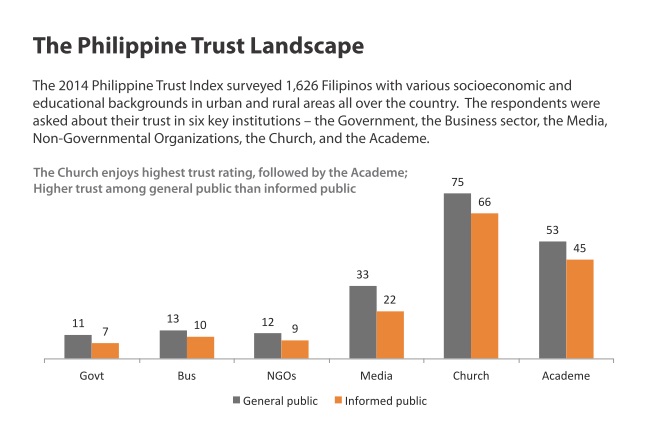FILIPINOS do not ask much from the government, results of EON’s Philippines Trust Index survey this year showed.
All they want is that their government “not be corrupt.”
Cora P. Guidote,SM Investment Corporation senior vice president for Investor Relations, one of the panelists in the presentation of EON PTI survey results last Monday, took note of that saying that normally, one says he wants an honest leader.
“The consciousness is about corruption,“Guidote said adding,” How can we aspire for an honest leader when we don’t even articulate what we want for a leader. “
An honest person is more than just not corrupt. It involves a higher sense of morality and integrity. One can be “not corrupt” but not totally an honest person.
For the Filipino people what they ask most from government officials is not to steal their money.
The sad thing about it is that “only less than 2 of 10 Filipinos ‘strongly agree’ that the government isn’t,” the survey showed.
EON’s 2014 PTI survey, conducted March and June this year, had 1,646 respondents nationwide both urban and rural areas.
EON, a business communications consultancy, had two sets of respondents: General Public(at least 18 years old, majority have not reached higher than 2nd year college, belong to Economic Class A to E, active use of different forms of media –broadcast, print, online) and Informed Public (adult Filipinos aged 25 years and above, with educational attainment of at least 3rd year college, belong to economic class A to C, and extensive access to print, online and broadcast media.)
This is the third PTI and is described by EON’s chairman and chief executive officer Junie del Mundo as “more robust as ever.”
It’s a deeper look into “an ever dynamic environment, where technology and changing social norms converge with our deep secret beliefs and traditions as a people, “ Del Mundo said.
It focused on six institutions: government, church, academe, media, business, and non-government organizations.
It is noteworthy that the Informed Public generally gave lower scores than the General Public.
The government got the lowest trust rating (GP, 11 percent, IP 7 percent) with the Church as the most trusted (GP 75 percent, IP 66 percent).
Second most trusted is Academe (GP53, IP45 percent ); Media (GP 33, IP32 percent), Business (GP13, IP 10 percent) , and a little higher than the government is NGOs (GP12, IP9 percent).
In the government sector, the Office of the President suffered the biggest drop, 12 points among the GP (from 28 percent in the 2013 PTI to this year’s 16 percent) and nine percent among the IP (from 24 to 15 percent).
The Senate was pushed down to the least trusted among government agencies (GP, from 15 to 7 percent; IP from 13 to four percent).
The Senate shares the cellar with the House of Representatives (GP, 9 percent, IP six percent).
For the General Public, the Cabinet got the highest trust rating with 17 percent, down from last year’s 19 percent.
Could it be that the President’s practice of taking the bullet for members of his cabinet involved in controversies took its toll on the people’s trust on him?
For the Informed public, it’s the Local Government Units that are the most trusted.
While 40.3 percent of the General Public said the most important driver for them to trust the government is “not corrupt,” only 11.7 percent said “competent leaders.” The number said, “provides basic needs of the poor.”
There are more interesting aspects of EON’s PTI survey which we hope to discuss in future columns.
“The results show that trust is dynamic and that it can be built and eroded. It also highlighted that for Filipinos, trust can break communication barriers and is a tool that grounds relationships, which is why it will always be worthwhile to invest in building trust,” shared Malyn Molina, EON Assistant Vice President for Business Development and Strategic Planning
The 2014 Public Trust Index:


